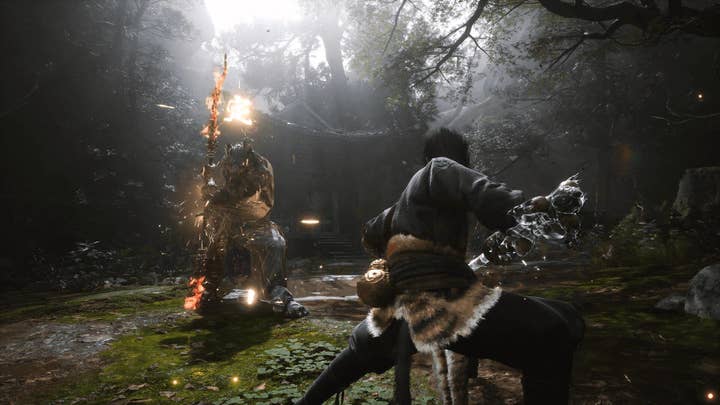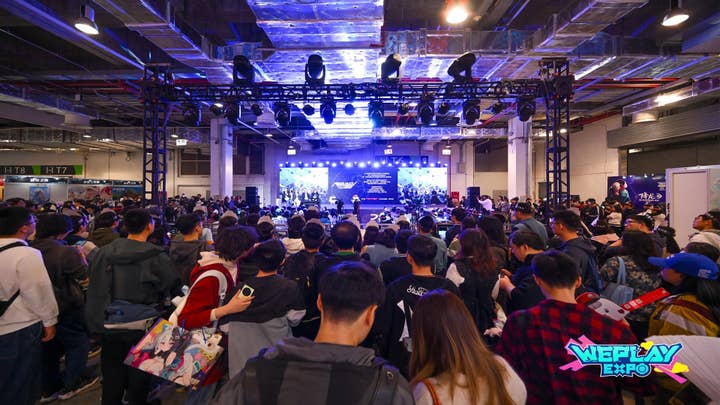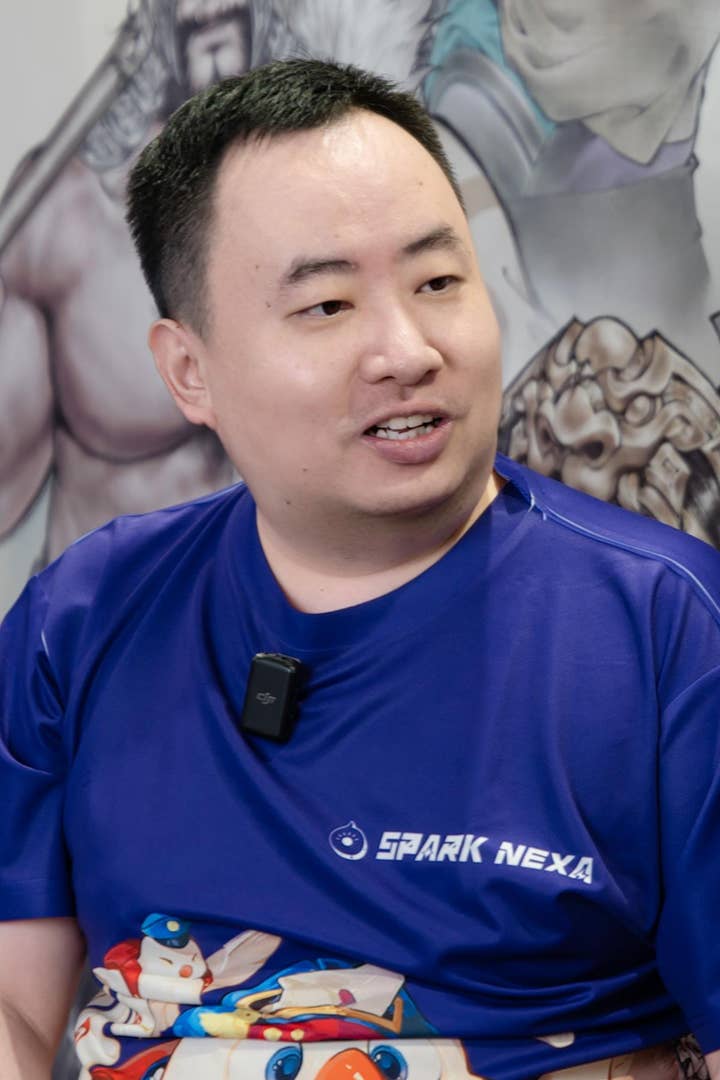The challenges and opportunities Black Myth: Wukong created for China's developers
Veterans of the Chinese games industry share insights on the challenges they face, and how the country might be shifting to even bigger premium titles
Black Myth: Wukong, developed by China-based studio Game Science, enjoyed a record-breaking performance when it released in August, reaching a peak of 2.4 million concurrent players as well as becoming the top-grossing game across multiple markets for the month.
Inspired by the renowned Chinese novel Journey to the West, Black Myth: Wukong is an anomaly in and of itself, since it's a single-player title only available on PC and the PlayStation 5, whereas many games that are developed and made available in China are of the free-to-play variety, including those with gacha mechanics. However, as reported by business research firm Niko Partners, China's games industry has continued to grow rapidly; it was cited that the country had 715.9 million gamers in 2023, and this number is expected to rise to 722.5 million in 2024 and 747.9 million by 2028. It's also worth noting that the Chinese video games market is expected to generate an annual revenue of $49.8 billion this year, with mobile games accounting for 68.7% of the revenue, followed by 28.4% for PC and 2.9% for consoles.
Given Black Myth: Wukong's success, we spoke with several industry experts and developers from China to learn their insights regarding this phenomenon, and whether this will lead to a shift in business strategies for studios and publishers, especially with regards to free-to-play versus premium/paid games.
Our respondents include Steven Wu, the former head of Tencent's NEXT Studio Shenzhen and Tencent Games global publishing. Steven now helms Emina Studio, which is currently working on ACE Strategy, a mecha-inspired trading card game.
We also chatted with Simon Zhu, founder of the China Independent Game Alliance (CIGA), the largest indie game organization in China. CIGA organizes several annual gaming conventions, such as the WePlay Expo, CIGA developer conference, and indiePlay Awards, and Game Jams.
Finally, we spoke with Spark Nexa's Jingwei 'Biaoge' Fang and members of the marketing team. Fang is the producer of Shenzhou Saga: Three Kingdoms, an upcoming strategy role-playing game (RPG) inspired by Luo Guanzhong's Romance of the Three Kingdoms which, similar to Journey to the West, is also one of the pillars of Chinese and East Asian literature.

With the success of Black Myth: Wukong, a game that showcases Chinese culture and traditions, how important is it for studios to present Chinese culture to a global audience?
Steven Wu: As a studio, we're excited to see Black Myth: Wukong doing so well worldwide. For ACE Strategy, our game reflects our understanding of sci-fi, mecha, and space exploration themes from around the world. Personally, I was also inspired by The Wandering Earth, which is based on a short story by Chinese author Cixin Liu.

Simon Zhu: I think the general idea among Chinese developers is to integrate cultural elements that they're familiar with in a way that feels natural. This allows players to see the developers' interpretation and expression of our culture, which might spark their own interest in it.
Black Myth: Wukong is a great example of how a well-crafted game can integrate cultural content in a way that resonates globally. I believe it's because certain cultural elements already have an audience familiar with these themes, such as Wuxia (martial arts) and Xianxia (immortality cultivation).
Jingwei 'Biaoge' Fang: I was introduced to video games 30 years ago, and many outstanding games from different genres and cultures around the world led me to pursue a career in the industry. Similarly, the story of Romance of the Three Kingdoms captivated me and members of the team from our childhood days to the present. We find that showcasing Chinese cultural traditions is important in our game, and we want to continue promoting our rich culture and stories.
Do you feel that the success of a single-player game like Black Myth: Wukong represents a shift in the Chinese games industry where more studios would focus on single-player or premium games instead of free-to-play titles?
Steven Wu: I believe larger companies are already motivated by Black Myth: Wukong's success and will start supporting more premium projects. Perhaps not a "full shift," but one that focuses on large-budget titles. Medium-to-large developers have already been focusing on cross-platform titles that have AAA quality, though most are still free-to-play due to the high development costs.
The phenomena that is Black Myth: Wukong could lead to more games that strongly represent Chinese culture and traditions, but more importantly, it could boost the confidence of Chinese creators in expressing their unique perspectives across various forms of art.
"Black Myth: Wukong is a great example of how a well-crafted game can integrate cultural content in a way that resonates globally"
Simon Zhu, CIGA
Simon Zhu: The success of Black Myth: Wukong holds significant implications for expanding and positively transforming societal perceptions of video games in China, but replicating this model or phenomenon is challenging.
Leading game companies have projects that may resemble AA or AAA titles, such as NetEase's Naraka: Bladepoint and the upcoming Ballad of Antara from Infold Games, but these [and many others] are still free-to-play due to exorbitant development costs. Moreover, attracting traffic in the PC and console markets is not as straightforward as on mobile platforms, compounded by concerns regarding pricing for single-player and console games, especially since Chinese consumers are particularly price-sensitive.
Personally, I feel that we need more games that can perform well in both Chinese and overseas markets within a reasonable cost range, alongside improvements in game quality to elevate the position of games that are developed in our country.

What are the main challenges that Chinese studios and developers face when breaking into Western markets?
Steven Wu: Breaking into any new market comes with challenges, like understanding platform policies, building media connections, localization, and payment systems. Since ACE Strategy is a sci-fi mecha game, we wondered about the level of quality that is "good enough" for Western players used to AAA titles and blockbuster films. Our team only consists of 20 people and there's only so much we can do, so it's hard to know where the bar is.

Thankfully, our concerns eased a little when we debuted ACE Strategy at Gamescom 2024 in Cologne, Germany. The reception was generally positive and we received great feedback from mecha and TCG lovers.
Simon Zhu: Compared to some countries and regions with a long-established gaming industry and content, China is still at a stage where breaking into the international market comes with massive costs. However, China's PC and console game development still lacks the accumulated experience found in some other markets. There's also the information gap: insights into Western users' behaviors and habits – how they interact with media, social platforms, influencers, and communities – are often insufficient.
That's why most of the Chinese games you hear about in the West come from big companies or are projects scaling up to large scales. The Chinese games that have made a name for themselves in the PC or console market are those that have significant financial backing, allowing them to promote their titles through high-profile events like The Game Awards or other major game expos.
Do you feel that there's a certain stigma associated with Eastern cultures in how they'd appeal to Western gamers, such as how Asian games still have European tropes or characters to have a more 'Western' feel?
Steven Wu: The strength of Asian culture, in my opinion, lies in its open-mindedness. Both players and developers are happy to enjoy and be influenced by great games from other regions. Some Chinese games might also incorporate more Western elements, not necessarily to appeal to Western audiences but because the developers themselves want to show how they're fans of those ideas.
Simon Zhu: Thinking broadly, cultural elements in games are no longer restricted by regions or stereotypes. With the increased global exchange and blending of cultures, we are seeing much more flexible adaptations of these elements in games [regardless of the studios making them]. Examples include Ghost of Tsushima (Sucker Punch Productions is a US studio) and Sifu (Sloclap is a French studio).
"Black Myth: Wukong could lead to more games that strongly represent Chinese culture and traditions, and boost the confidence of Chinese creators in expressing their unique perspectives across various forms of art"
Steven Wu, Emina Studio
Jingwei 'Biaoge' Fang: I somehow agree with this opinion. For example, a large number of Japanese fantasy RPGs are based on Western fantasy worldviews. This might be because numerous successful Western fantasy themes already proved the genre's popularity. 'Western'-style games are numerous enough to be divided into many smaller niches, while many 'Eastern' stories remain undiscovered.
I believe more Western players will gradually come to appreciate Eastern stories, and vice versa. It's similar to appreciating how our culture and history are shared in games that are made internationally. For example, Total War: Three Kingdoms was developed by Creative Assembly's European teams, yet the game was praised by Chinese players for its high quality and production values.

From an Automaton interview, it was reported that Sega avoided gacha mechanics in Sonic Rumble as these are "shunned overseas" [or in Western markets]. However, we've also seen the global success of free-to-play gacha games, such as Genshin Impact and Wuthering Waves. Is there a middle ground when it comes to gacha? At what point does gacha become predatory or egregious?"
Steven Wu: Both premium and free-to-play models focus on providing high-quality and unique experiences, though free-to-play developers often need to adopt a game as a service mindset, managing content releases carefully while balancing the experience between paying and non-paying users.
At the end of the day, developers need to earn a living, and both models can be healthy and sustainable providing that there's a clear boundary on commercial systems. Respecting the trust and relationship with players is key to long-term success, regardless of the business model.
Simon Zhu: Genshin Impact and Wuthering Waves share a common element: they are anime-style games that attract a distinct user demographic, some of whom may have a strong emotional connection with characters that increases their willingness to spend.

In terms of gacha mechanics, we have to examine the card/loot/reward pool, specifically how player-friendly it is. Features like a pity mechanism (which guarantees a limited or rare item after a certain number of attempts) and opportunities to earn more draws through in-game events can enhance player satisfaction, rather than relying solely on financial investment.
Jingwei 'Biaoge' Fang: When a game can provide stat curve upgrades that are worth the cost of gacha draws, there is a theoretical perfect equilibrium. However, in real life, players may have different budgets and expectations (even when they play the same game). What developers can do is ensure that the gacha mechanics can meet the expectation of most paid players, and increase the percentage of satisfied paid players by refining gacha mechanics according to purchasing behaviors.
As for Shenzhou Saga, we have not yet fully finalized our monetization model, yet we [follow] our development principle – 'heroes experience as the focus, strategic depth as the essence' – so we aim for monetization that can ensure a good experience for players.

Some companies have released free-to-play gacha games before launching single-player premium titles, such as Cygames with Granblue Fantasy (followed by Versus and ReLink), as well as Neople and Nexon with Dungeon & Fighter (followed by the upcoming The First Berserker: Khazan). Do you feel that this process – finding success with a free-to-play model first – is a viable option that decreases the risk in making a premium title later on?
Steven Wu: There's no standard answer to this question, but I believe that companies making free-to-play games can benefit from their market-driven, data-focused approach, especially after gaining years of experience running multiplayer games. I hope in the near future, the bigger companies will start funding more premium internal projects and investing in smaller studios. Tencent, in particular, had been doing a great job at expanding their influence to support both free-to-play and premium/indie game developers.
"I believe more Western players will gradually come to appreciate Eastern stories, and vice versa"
Jingwei 'Biaoge' Fang, Spark Nexa
Simon Zhu: From my understanding, the investment required when making a free-to-play game is higher than that of a premium, paid game. It’s only when the free-to-play game is highly successful, with its IP and large user base built up, that you can consider creating more content. Still, developing a premium game [past that point] carries an inherent risk. For teams of a certain scale, the adjustment to a premium game will involve team upgrades, maintaining operations, sustaining value, and improving development capabilities.
Jingwei 'Biaoge' Fang: I personally agree with your point. The Shenzhou Saga team is still a relative newcomer in the industry. From both a professional and business perspective, we first need to make sure our game succeeds — essentially, we have to sustain the team before pursuing our future ambitions. If the free-to-play game does well, it will pave the way for more ambitious plans, which are often riskier.

